| Listing 1 - 10 of 12 | << page >> |
Sort by
|
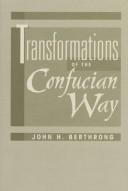
ISBN: 0813328047 0813328055 9780813328058 9780813328041 Year: 1998 Publisher: Boulder (Colo.) : Westview press,
Abstract | Keywords | Export | Availability | Bookmark
 Loading...
Loading...Choose an application
- Reference Manager
- EndNote
- RefWorks (Direct export to RefWorks)
Book
ISBN: 0791477894 1435695437 9781435695436 9780791477892 0791475158 9780791475157 Year: 2008 Publisher: Albany State University of New York Press
Abstract | Keywords | Export | Availability | Bookmark
 Loading...
Loading...Choose an application
- Reference Manager
- EndNote
- RefWorks (Direct export to RefWorks)
Brings Chinese Daoist and Confucian thought into conversation with Western process, pragmatic, and naturalist philosophy and theology.
Philosophy and religion --- Philosophy and religion. --- Philosophy, Chinese. --- Philosophy. --- Mental philosophy --- Humanities --- Chinese philosophy --- Christianity and philosophy --- Religion and philosophy --- Religion --- Philosophy --- Philosophy, Chinese
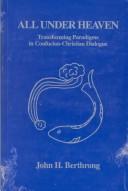
ISBN: 058504452X 9780585044521 079141857X 0791418588 0791496651 Year: 1994 Publisher: [Place of publication not identified] State University of New York Press
Abstract | Keywords | Export | Availability | Bookmark
 Loading...
Loading...Choose an application
- Reference Manager
- EndNote
- RefWorks (Direct export to RefWorks)
Christianity and other religions --- Confucianism --- Christianity --- Philosophy, Confucian --- Neo-Confucianism --- Religion --- Philosophy & Religion --- Philosophy, Chinese --- Confucian philosophy --- Religions --- Relations --- Philosophy --- 299.512 --- 299.512 Confucianisme. Mencius. I Ching --- Confucianisme. Mencius. I Ching --- Relations&delete& --- Philosophy, Confucian. --- Neo-Confucianism. --- Confucianism. --- Relations. --- Philosophy.
Book
ISBN: 9780791475164 0791475166 Year: 2009 Publisher: New York: State university of New York press,
Abstract | Keywords | Export | Availability | Bookmark
 Loading...
Loading...Choose an application
- Reference Manager
- EndNote
- RefWorks (Direct export to RefWorks)
Expanding Process explores how comparative philosophy expands our understanding of the critical themes of process, change, and transformation. John H. Berthrong examines how notions of process manifest and shape the classical Confucianism of Xunzi, the early medieval Daosim of the Liezi, and Zhu Xi's Song Dynasty daoxue (Teaching of The Way). Berthrong links these various Chinese views of process and transformation to contemporary debates in the American process, pragmatic, and naturalist philosophical movements. Stressing how our pluralistic world calls for comparing and even appropriating insights from diverse cultural traditions, Berthrong contends that comparative philosophy and theology can broaden the intellectual frontiers and foundations of any serious student of contemporary global thought. "This is one of the best examples of comparative philosophy that I have seen in a very long time. It is an eminently readable exposition that puts Chinese philosophy into a global and contemporaneously relevant context, while also deftly drawing on the very best scholarship on the history of Chinese thought and American philosophy." -- Judith A. Berling, author of Understanding Other Religious Worlds: A Guide for Interreligious Education.
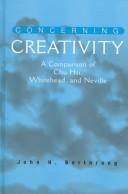
ISBN: 0791439445 Year: 1998 Publisher: Albany State university of New York press
Abstract | Keywords | Export | Availability | Bookmark
 Loading...
Loading...Choose an application
- Reference Manager
- EndNote
- RefWorks (Direct export to RefWorks)
Creative ability --- Neo-Confucianism --- Philosophy, Comparative --- Process philosophy --- Neville, Robert C. --- Whitehead, Alfred North --- Zhu, Xi,
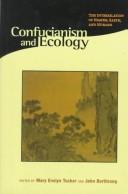
ISBN: 0945454163 0945454155 9780945454168 9780945454151 Year: 1998 Publisher: Cambridge (Mass.): Harvard university press
Abstract | Keywords | Export | Availability | Bookmark
 Loading...
Loading...Choose an application
- Reference Manager
- EndNote
- RefWorks (Direct export to RefWorks)
Confucianism demonstrates a remarkable wealth of resources for rethinking human-earth relations. This second volume in the series on religions of the world and the environment includes sixteen essays that address the ecological crisis and the question of Confucianism from three perspectives: the historical describes this East Asian tradition's views of nature, social ethics, and cosmology, which may shed light on contemporary problems; a dialogical approach links Confucianism to other philosophic and religious traditions; an examination of engaged Confucianism looks at its involvement in concrete ecological issues.
S12/0400 --- S20/0500 --- S12/0214 --- China: Philosophy and Classics--Kongzi 孔子 Confucius and Confucianism --- China: Agriculture forestry, fishery, natural disasters--Environmental policy, pollution --- China: Philosophy and Classics--Philosophy of nature --- Ecology --- Environmental ethics --- Philosophy, Confucian --- Confucian philosophy --- Confucianism --- Philosophy, Chinese --- Environmental quality --- Human ecology --- Ethics --- Balance of nature --- Biology --- Bionomics --- Ecological processes --- Ecological science --- Ecological sciences --- Environment --- Environmental biology --- Oecology --- Environmental sciences --- Population biology --- Philosophy --- Moral and ethical aspects --- Philosophy, Confucian. --- Philosophy. --- Ecology - China - Philosophy. --- Environmental ethics - China.
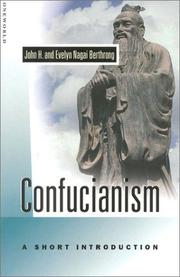
ISBN: 1851682368 9781851682362 Year: 2000 Publisher: Oxford Oneworld
Abstract | Keywords | Export | Availability | Bookmark
 Loading...
Loading...Choose an application
- Reference Manager
- EndNote
- RefWorks (Direct export to RefWorks)
Uniquely blending scholarship with a highly original approach, this new introduction to Confucianism is an informative and intriguing guide to China's ancient philosophical tradition. Against the backdrop of seventeenth-century China, the book follows a Confucian couple, together with their family, friends and staff, through a typical day. The result offers a fascinating insight, not only into the intellectual and scholarly aspects of Confucianism, but also into the nature of belief, culture and society in a living philosophical tradition. The key topics covered include: the intellectual and social role of women Confucianism, art and poetry the relationship with the Western world and Western faiths Capturing the full scope of an ancient tradition, this innovative, well-researched and accessible text will be appreciated by anyone interested in Confucianism - scholars, students and general readers alike.
Book
Year: 2014 Publisher: Basel : MDPI - Multidisciplinary Digital Publishing Institute,
Abstract | Keywords | Export | Availability | Bookmark
 Loading...
Loading...Choose an application
- Reference Manager
- EndNote
- RefWorks (Direct export to RefWorks)
Comparative theology is a field with a lineage as long as the earliest efforts by believers to engage, understand, learn from and critique other religions. In the 1980s and 1990s, scholars revived the field as timely in light of today's religious diversity. They have given it some new characteristics, tried new methods, and argued for fresh implications, and thus in a real sense reinvented the discipline, affording new energy to the study of religions in practice and in the particular, without undue a priori attention to theoretical presuppositions and issues of method. Now younger theologians in different traditions have further interrogated its presumptions and practices and brought it into conversation with post-colonialism, gender studies, ethnographic research, and a (re)turn to theologies of religious pluralism. This thematic issue focuses on the European context to see how this new field has been received, understood, and critiqued among scholars writing in Europe.
Religion --- Methodology.
Book
Year: 2014 Publisher: Basel : MDPI - Multidisciplinary Digital Publishing Institute,
Abstract | Keywords | Export | Availability | Bookmark
 Loading...
Loading...Choose an application
- Reference Manager
- EndNote
- RefWorks (Direct export to RefWorks)
Comparative theology is a field with a lineage as long as the earliest efforts by believers to engage, understand, learn from and critique other religions. In the 1980s and 1990s, scholars revived the field as timely in light of today's religious diversity. They have given it some new characteristics, tried new methods, and argued for fresh implications, and thus in a real sense reinvented the discipline, affording new energy to the study of religions in practice and in the particular, without undue a priori attention to theoretical presuppositions and issues of method. Now younger theologians in different traditions have further interrogated its presumptions and practices and brought it into conversation with post-colonialism, gender studies, ethnographic research, and a (re)turn to theologies of religious pluralism. This thematic issue focuses on the European context to see how this new field has been received, understood, and critiqued among scholars writing in Europe.
Religion --- Methodology.
Book
Year: 2014 Publisher: [Place of publication not identified] MDPI
Abstract | Keywords | Export | Availability | Bookmark
 Loading...
Loading...Choose an application
- Reference Manager
- EndNote
- RefWorks (Direct export to RefWorks)
| Listing 1 - 10 of 12 | << page >> |
Sort by
|

 Search
Search Feedback
Feedback About UniCat
About UniCat  Help
Help News
News